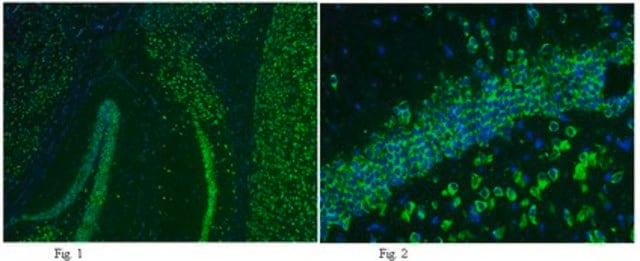MAB5416
Anti-Glutamate Receptor 3 Antibody, clone 3B3
clone 3B3, Chemicon®, from mouse
Synonym(s):
AMPA-selective glutamate receptor 3, Glutamate receptor ionotropic, AMPA 3, glutamate receptor 3, glutamate receptor C, glutamate receptor subunit 3, glutamate receptor, ionotrophic, AMPA 3
About This Item
Recommended Products
biological source
mouse
Quality Level
antibody form
purified antibody
antibody product type
primary antibodies
clone
3B3, monoclonal
species reactivity
monkey, mouse, human
species reactivity (predicted by homology)
rat
manufacturer/tradename
Chemicon®
technique(s)
immunocytochemistry: suitable
immunohistochemistry (formalin-fixed, paraffin-embedded sections): suitable
western blot: suitable
isotype
IgG1κ
NCBI accession no.
UniProt accession no.
shipped in
dry ice
target post-translational modification
unmodified
Gene Information
human ... GRIA3(2892)
General description
Specificity
Immunogen
Application
Optimal working dilutions must be determined by end user.
Quality
Target description
Physical form
Analysis Note
Brain
Hippocampal tissue
Legal Information
Not finding the right product?
Try our Product Selector Tool.
Storage Class Code
12 - Non Combustible Liquids
WGK
WGK 2
Flash Point(F)
Not applicable
Flash Point(C)
Not applicable
Certificates of Analysis (COA)
Search for Certificates of Analysis (COA) by entering the products Lot/Batch Number. Lot and Batch Numbers can be found on a product’s label following the words ‘Lot’ or ‘Batch’.
Already Own This Product?
Find documentation for the products that you have recently purchased in the Document Library.
Our team of scientists has experience in all areas of research including Life Science, Material Science, Chemical Synthesis, Chromatography, Analytical and many others.
Contact Technical Service








